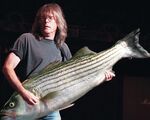Post-rock

Prog rock is an experimental music genre characterized by the use of guitar effects and other means to create lots of weird sounds over a period of twenty minutes or longer. Post-rock music often includes crescendos, dissonance, ambience, and the sounds of nude beatniks rolling their own cigarettes in the bathroom of a rundown music venue.
The quality of a post-rock band is measured through the additives of four main factors:
- The average word count of the band name and song titles.
- The average time length of songs.
- How many band members there are.
- How many side projects the band has (including side projects of side projects).
History[edit]
The origin of post-rock is reckoned by hipster music historians from the time John Cage went back in time to a feline fetish brothel in France circa 1637 with a prototype Texas Instruments transistor radio and gutted its circuitry to make an ear-piercing sound as a distraction while he ransacked the place for a kitten huffing fix. The latter is of course problematic because it would mean that post-rock predates rock music.
Some critics make the claim that 1980s band Talk Talk pioneered post-rock, but no one pays attention to this because the band did in fact suck quite badly and any resemblance to post-rock was probably a simple failure to create rock music. Because of this apparent suckage, it is often assumed that the post-rock band Turtle continued Talk Talk's legacy by creating a terribly boring band yet maintaining a strong following through diehard hipsters who argue that Turtle was the first to use a Celtic harp made from Andy Warhol's hair in their hit song Penis Wrapped in Rubber.
Through the mid to late 1990s, post-rock maintained its underground hipster popularity. Bands such as Frogwai thrived with freakin' sweet drumming and what experimental musician Brian Eno called repetitive yet totally cool dude spacey neato woo daddy!!! that is far out sounding guitars.
Today, post-rock maintains popularity with bands like Explosions in my Ass, who perfected the rock crescendo with such a cinematic quality that they created the soundtrack for the 2004 film Friday Night Dykes. Because of this band's association with a piece of media that was known outside of secret DC++ hubs and the ex-girlfriends of hipster assholes, they are now abhorred in the indie community.
Musical characteristics[edit]

Post-rock owes its influence to a combination of cocaine-addict Jazz musicians, acid-loving Kraut-rock musicians, and boredom-induced electronic musicians. Post-rock often uses more intricate timing than rock, since (unlike the average rock musician) most post-rockers are high school graduates and therefore can count higher than 3.
A typical post-rock song will begin with some random recorded found sound, such as a spliced-up conversation between two semi-retarded Gypo thieves planning a siege on an American embassy. Then, after several minutes, the first instrument will kick in--likely guitars, drums, or belching. This will go on for a while until next band member's instrument gets back from a bathroom break where illegal doses of coca-cola may or may not have been snorted. This next band member will layer the music with another instrument. This will be followed by a third, and a fourth, and a fifth, and so forth. Gradually, the music's white noise's intensity will increase. Things are really heating up now! That hot bass guitarist may even break a sweat! By now, miraculous pregnancies occur nationwide and somewhere a banker may shed a single tear. After the crescendo reaches its orgasmic apex, the song will stop and revisit the song's original soft delightful sound and the band members will retrieve their stuffed animals and make sweet love to each other in their tight jeans, trucker hats and loose fitting t-shirts.
Post-rock occasionally incorporates electronic soundscapes for a timbre effect experimental musician Robert Fripp called some extra super cool sweetness. Post-rock songs generally last until the band members get bored or tired of playing the same notes over and over again and decide to go see what's new on Pitchfork. Many Canadian post-rock bands make use of orchestral instruments like violins, cellos, and dildo drumsticks for a more dramatic sound.
